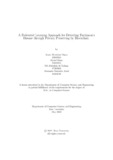A federated learning approach for detecting Parkinson’s disease through privacy preserving by blockchain
Abstract
Parkinson’s disease is a degenerative ailment caused by the loss of nerve cells in
the brain region known as the Substantia Nigra, which governs movement. These
nerve cells die or deteriorate, rendering them unable to produce an essential neurotransmitter
called dopamine. The loss of dopamine in the basal ganglia precludes
normal function when the substantia nigra neurons are harmed in large numbers.
This results in the motor symptoms of Parkinson’s disease, including tremor, rigidity,
decreased balance, and lack of spontaneous movement. For the detection of PD,
traditional machine learning algorithms have been used in many research papers.
However, traditional ML algorithms always put a risk on the sensitivity of patients’
data privacy. This research proposes a novel approach to detect PD by preserving
privacy and security through Blockchain-based Federated Learning. FL may train a
single algorithm across numerous decentralized local servers as an improved version
of the ML approach instead of trading gradient information. Blockchain can be
effectively used to preserve privacy and secure transactions (i.e., gradient) between
local and central servers. The proposed model has been tested and evaluated by
using three CNN models (VGG19, VGG16 & InceptionV3) in this research, and
within these models VGG19 has the best accuracy of 97%. The result demonstrates
that this model is very accurate for detecting PD by preserving one’s privacy and
security through Blockchain-based Federated Learning.

